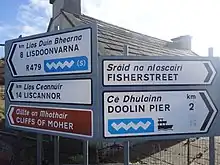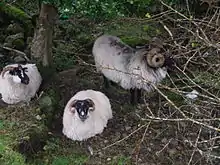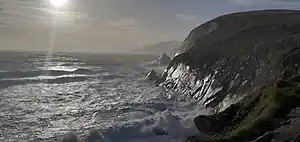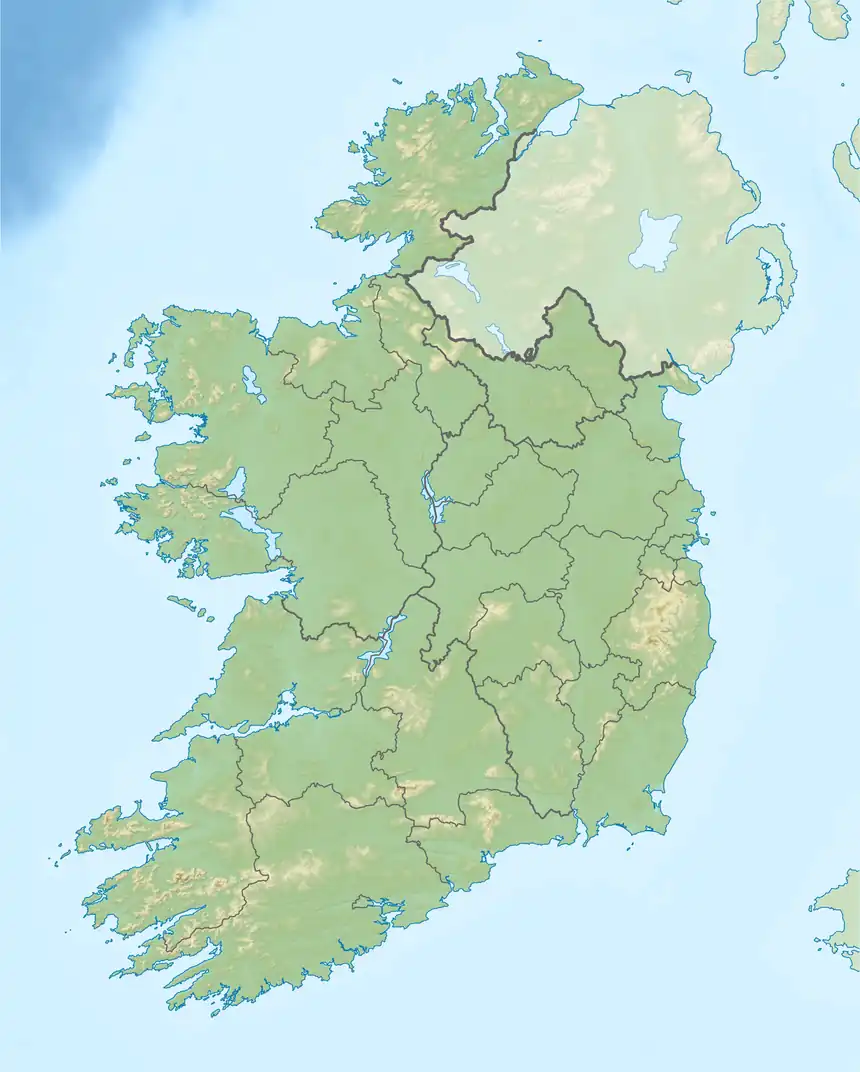Wild Atlantic Way
The Wild Atlantic Way (Irish: Slí an Atlantaigh Fhiáin) is a tourism trail on the west coast, and on parts of the north and south coasts, of Ireland. The 2,500 km[1] (1,553 mile) driving route passes through nine counties and three provinces, stretching from County Donegal's Inishowen Peninsula in Ulster to Kinsale, County Cork, in Munster, on the Celtic Sea coast.[2]

Description
Some of the most popular attractions along the Wild Atlantic Way include the Cliffs of Moher, the Skelligs Viewpoint, the Dingle Peninsula, the Old Head of Kinsale, and Downpatrick Head.
The route also passes through numerous charming towns and villages that offer a taste of Irish culture and hospitality. Visitors can sample traditional music and dance, enjoy locally produced food and drink, and explore the unique arts and crafts of the region.
The route is broken down into five sections:[3]
- County Donegal
- County Donegal to County Mayo
- County Mayo to County Clare
- County Clare to County Kerry
- County Kerry to County Cork
Along the route, there are 157 discovery points, 1,000 attractions and more than 2,500 activities.
The route was officially launched in 2014 by the Minister of State for Tourism and Sport, Michael Ring, T.D.[4]
Key points of interest
North West - Donegal, Leitrim and Sligo

- Malin Head, Ireland’s most northerly point
- Lough Foyle
- Lough Swilly
- Isle of Doagh
- Carrickabraghy Castle
- Shrove
- Fort Dunree
- Buncrana
- Grianán of Aileach (Greenan Fort)
- Ramelton
- Rathmullan
- Fanad
- Rosguill
- Doe Castle
- Derryveagh Mountains
- Horn Head
- Tory Island
- Árainn Mhór (Arranmore Island)
- Gaoth Dobhair
- The Rosses
- Errigal
- Malin Beg beach
- Slieve League cliffs
- Largy Waterfall (also known as 'South Donegal's Secret Waterfall')
- Blue Stack Mountains
- Donegal Town
- Bundoran – popular with surfers
- Tullaghan
- Mullaghmore Head
- Spanish Armada shipwrecks at Streedagh Beach
- Rosses Point Peninsula
- Aughris
- Easky
- Enniscrone
West - Mayo and Galway

- The Céide Fields
- The Mullet Peninsula
- Achill Island
- Clew Bay
- Croagh Patrick
- Clare Island
- Inishturk – accessible by ferry from Louisburgh, County Mayo
- Doolough
- Killary Harbour
- Connemara
- Clifden
- Inishbofin – accessible by ferry from Cleggan, County Galway
- Oileáin Árann (Aran Islands) – accessible by ferry from Inverin County Galway and Doolin County Clare.
Mid West - Clare and Limerick
- The Burren
- The Cliffs of Moher and the Doolin Cliff Walk
- Loop Head
- The Shannon Estuary and the Shannon dolphins
South West - Kerry and Cork

- Allihies and the Allihies Copper Mine Museum on the Beara Peninsula
- Bere Island
- Cape Clear
- Caherdaniel
- Derrynane beach
- Garnish Island in Glengarriff
- The ruined cottages of Great Blasket Island, and the Blasket Centre in Dunquin
- Dingle, Ireland’s largest Gaeltacht town
- Rossbeigh beach
.jpg.webp)
- The Skellig Experience Visitor Centre
- Dursey Island - Accessible by Ireland’s only cable car
- Heir Island
- Long Island
- Sheep's Head – the Sheep's Head peninsula is home to the Sheep's Head Way walking and cycling routes.
- Mizen Head – Ireland's southernmost point, with views of Fastnet Rock and Lighthouse
- Kinsale
- Whiddy Island and Whiddy Island view on R572 road
Impact
The Wild Atlantic Way has had a significant impact on tourism in Ireland, attracting millions of visitors from around the world. It has also provided a boost to local economies, particularly in rural areas where tourism is a key industry. The route has been widely recognized for its role in promoting sustainable tourism and preserving the natural and cultural heritage of the west coast of Ireland.[5]
See also
References
- "Ireland's Wild Atlantic Way aims to rival California's Pacific Coast Highway". Belfast Telegraph. 28 February 2014. Retrieved 1 February 2017.
- Charles Karel Bouley (23 March 2014), "Ireland's Wild Atlantic Way: Heading West On Adventure", The Huffington Post, retrieved 31 March 2014
- "The Wild Atlantic Way". 28 January 2017. Retrieved 1 February 2017.
- "Minister Ring officially launches Wild Atlantic Way", Fáilte Ireland, 27 February 2014, retrieved 28 June 2016
- McCafferty, Hugo (June 2, 2017). "What is the Wild Atlantic Way effect?". Irish Independent. Retrieved April 13, 2023.
External links
- Official website from Discover Ireland
- Wild Atlantic Way on the Tourism Ireland website.
- Wild Atlantic Way in County Mayo
